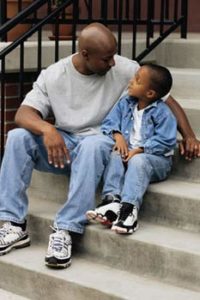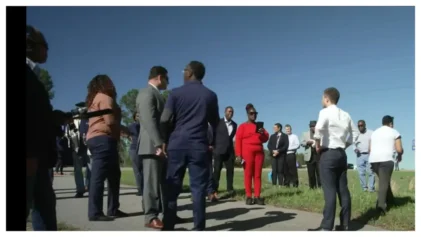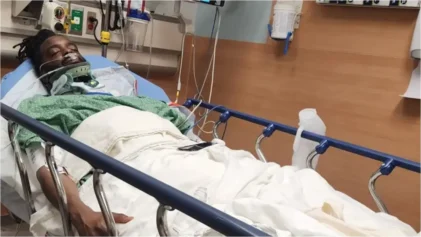Dr. Frances Cress Welsing, a third generation physician and author, reminds us that Black children are not blind or immune from racism. She summarizes a 10-year-old Black child vindicating his refusal to study hard in school to aid Black people:
“Even young Black children are able to perceive and articulate that ‘if you try to help Black people, you will be killed.’ The chill of this reality inherent in the maintenance of white supremacy does not escape Black children…”
From the assassination of Dr. Martin Luther King, Jr., to the terrorist assault on Mother Emanuel A.M.E. Church, the realization of racism brands each generation of Black children. It’s a realization that Black life is not valued and that we have powerful, racist, white enemies.
Twelve months of ceaseless Black carnage has been a daily scorching from the branding iron.
In August of 2014, multitudes of Black children were permanently scarred when Ferguson’s Michael Brown, Jr. was killed and abandoned like litter in the road. Compounding the trauma of a slain Black teen, the subsequent protests and police clashes delayed the start of the school year and devastated St. Louis’ Black youth.
Missouri’s KMOV described Black girls as young as five as being “despondent” about missing the first day of school. Ferguson’s nightly conflicts, which featured fires, tear gas, gunfire and police hooliganism, disrupted sleep patterns and terrified neighborhood children for months.
The president of the St. Louis Association of Black Psychologists, Dr. Marva Robinson, recounts a profound moment following the non-indictment of Brown’s killer, Darren Wilson:
“One of the children that I had been treating prior to this – I saw her after the grand jury announcement. And she continued to repeat, the Little Caesars burned down. The Little Caesars burned down. And so seeing that image and knowing that this particular pizza place was her every weekly Friday night treat – and now it’s gone – was very hard for her to deal with. And so Mom has had a tough time… with getting her to bed at night. She’s been having some flashbacks about the image that she saw on the news. And so parents have a really big battle ahead of them…”
One of Dr. Robinson’s duties as a Black psychologist is to help Black parents win this battle. She offers practical recommendations to help parents protect and fortify the mental health of Black children.
Her number one suggestion is that Black parents monitor their own feelings and anxieties. She reminds us “children absorb energy from parents;” they are remarkably adept at detecting when mom and dad are not right. Additionally, if the parent is emotionally or spiritually fatigued, it will be impossible to adequately observe and respond to the needs of our offspring. Self-care is a Black parenting essential.
Next, Dr. Robinson insists that Black parents not be fearful about discussing white power with our daughters and sons. We’ve accumulated an array of justifications for refusing this discussion—we don’t want our children to hate white people; we doubt children’s capacity to understand racism. Shame. These are lucid concerns but mediocre excuses for ignoring the greatest threat to any Black child’s prosperity.
Dr. Robinson asserts that truthful dialog about racism is a part of healthy, appropriate Black child development. She warns that a failure to inform Black children about racism means, “They are going to learn that lesson from… someone else.” That “someone” could have a low opinion of Black people or a misunderstanding of racism. Which is why Dr. Robinson concludes, “It’s better for a parent to control that narrative, boost that child’s self esteem, and teach their [Black] children about how great they really are before the outside world starts to tear them down.”
The deluge of cell phone and dash cam recordings of Black suffering and death can shred the fragile, maturing psyche of Black youth. Dr. Robinson suggests that parents assume that even elementary-aged children are hearing commentary and viewing material about the racial incidents that have captivated the globe. This can have a pronounced influence on your child’s well being, even if they’re unable to verbalize the source of their discontent. She offers a list of behavioral changes Black parents should not minimize:
Spending more time on the computer, avoiding face-to-face conversation
Increased moodiness
Bedwetting
Significant increase or decrease in appetite
Significant changes in sleep
Wanting to sleep with parents more, not wanting to sleep in their room
Headaches
Dr. Robinson submits that any of these behaviors could be “normal responses to trauma and the stress that they’re under.” It’s imperative that parents cultivate and maintain a therapeutic, nourishing relationship with our children, so that they trust us when they’re in pain.
A May report in JAMA Pediatrics underscores the magnitude of Black anguish. The study found that over the last two decades, “the suicide rate increased significantly in black children” aged five to 11. While Dr. Robinson could not substantiate the research findings, she disclosed that she has received an increased volume of calls concerning Black children making veiled comments about self-injury. Even “casual” remarks about not wanting to live or self-harm cannot be reduced to cranky adolescence or exaggeration. Any suggestion that the mental health of our Black child has been compromised must be regarded as the highest priority.
And, as a parent, immediately and without shame seek help if and when you need it. Parenting while Black is rigorous.
Descriptions of the June 17 desecration of Emanuel A.M.E. capture the decimation of Black childhood under conditions of racism. William Dudley Gregorie spoke with the New York Times following the assassination. He reported that, “one of the younger kids in the church literally had to play dead” to avoid being killed.
Combining the logic displayed by Dr. Welsing’s 10-year-old and Mother Emanuel’s courageous 5-year-old reveals the grim assessment many Black children have made of a world dominated by white terrorism:
Don’t help Black people + Imitate Death = Black survival
Gus T. Renegade is the host of The C.O.W.S. Talk Radio – a platform designed to dissect and counter racism. He has interviewed and researched authors, filmmakers and scholars from around the globe.



